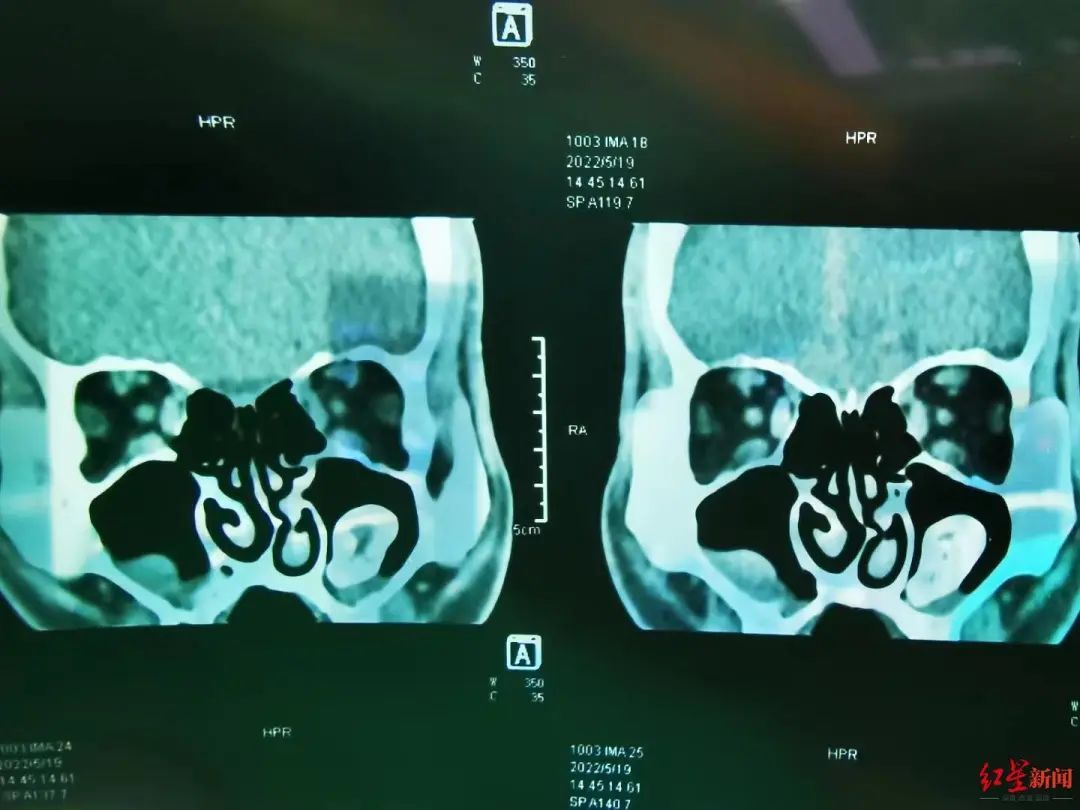“Did you know that the uncle in the ward has a tooth growing in his nose.” At the end of May and early June, among the patients of Chengdu No. 363 Hospital, there was such a patient in the hospital. The Red Star News reporter recently learned that the matter is true or not. Patient Chen Gang (pseudonym) went to the hospital at the end of May because of facial pain for half a year. Unexpectedly, during the examination, the doctor found that he had a well-grown molar in his nose (Note: also called molars, the teeth on both sides of the back of the mouth, shaped like a molar.) The hospital’s otolaryngology head and neck surgery department who treated him The team leader Zhong Ling told reporters that this is not a rare disease, and the professional name is dentin cyst. “Every year, the outpatient clinic receives one or two cases, and surgery is enough.” “A tooth was pulled” Six months ago, Chen Gang, a 45-year-old self-employed businessman from Xipu, suddenly felt pain in his face. He thought back and analyzed it carefully, and felt that he had never been bumped or slapped in the face, so how could it hurt? He first tried taking painkillers himself, only to find that over time, the effects of the drugs became less and less effective, and his face became more and more sore. According to reports, the pain at that time was mainly concentrated in and around the nose, and the appearance looked no different from normal people. However, in May, Chen Gang felt that his sleep and eating were seriously affected, so he had to be careful when picking his nose. Sometimes it even felt a little swollen to the touch. . So he went to the Xipu branch of the 363 Hospital to seek treatment. Subsequently, the hospital doctor Zhong Ling conducted a specialist physical examination on him. Nasal endoscopy was performed, and no special abnormality was found. Then, a CT examination was performed. It was found that the patient had thickened mucous membranes and empyema in the upper sinuses, and there were images of high-density substances in the middle. The operation was carried out immediately, and after doctors removed the secretions and abscesses from the patient’s nasal cavity, they discovered that the high-density material was actually a tooth. After the pathological examination, it was finally confirmed that it was a tooth, and it was still a molar!

↑Video data
Doctor: Because of the reversed teeth, one or two cases of odontogenic cyst appeared in the outpatient clinic for one year. Chen Gang’s condition was actually edentulous cyst. What is a dentigerous cyst? Professional explanations say that it occurs after the formation of the crown or root, and there is a dentifrice cyst formed between the remnant enamel epithelium and the crown. Most of them come from a single tooth germ, and the cyst contains one tooth clinically; it can also come from multiple tooth germs, and the cyst contains multiple teeth clinically. Zhong Ling said that edentulous cysts are normal teeth that grow in an abnormal direction, “Normal teeth have roots on top, and teeth grow into the mouth, but the patient’s (Chen Gang) tooth grows in the opposite direction and grows into the nasal cavity. “Although many people have heard of teeth growing in their noses for the first time, Zhong Ling said that the outpatient clinic of the hospital receives one or two cases every year, so it is not a rare disease. And Chen Gang’s dentin cyst is not the most serious. Zhong Ling told reporters that dentin cyst generally grows in the maxillary sinus of the nasal cavity. In the more serious cases she has encountered, not only surgery is required to open the patient’s maxillary sinus, but also related dental surgery is required. . With the rapid development of modern medical technology, these are no longer intractable diseases. Taking Chen Gang as an example, it only takes about three weeks from surgery to cure. Exploring the Causes of Developmental Abnormalities Not Related to Genetics Regular dental care can screen for odontogenic cysts What causes odontogenic cysts? Is it related to heredity, or is it related to personal daily habits? In this regard, Zhong Ling explained that odontogenic cysts originate from abnormal development during the embryonic period. This is a natural abnormality, which is random, has nothing to do with genetics, and has little to do with living habits. However, it should be noted that regular dental care can screen for cases. Patients like Chen Gang may have developed such abnormal development when he was young. However, in the previous decades of his life, this abnormal molar had no effect, but in the past six months, due to living in an environment with increased work pressure, this tooth stimulated the mucosal hyperplasia in the nasal cavity and triggered cyst accumulation. Pus, inflammation, and then pain.
Chengdu Business Daily-Red Star News reporter Dai Jiajia Photo courtesy of the interviewee